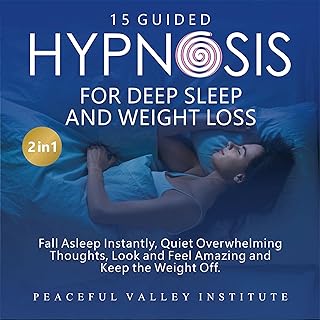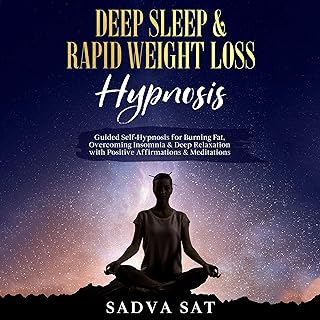Weight Loss and Sleep: Unlocking the Surprising Connection
Key Takeaways
| Topic | Summary |
|---|---|
| How Improving Your Sleep Can Help You Lose Weight | Discusses the direct relationship between quality sleep and effective weight management. |
| The Surprising Effect of Sleep on Weight Management | Highlights unexpected ways in which sleep influences weight control. |
| Understanding the Connection Between Sleep and Weight | Explains the scientific underpinnings of how sleep patterns affect weight. |
| Strategies to Improve Sleep for Weight Loss | Offers actionable advice on enhancing sleep quality to support weight loss goals. |
| The Impact of Sleep Deprivation on Weight Gain | Explores how lack of sleep can lead to weight gain and hamper weight loss efforts. |
| Harnessing the Power of Sleep to Enhance Weight Loss | Discusses ways to leverage sleep for achieving weight loss and better health overall. |
| Tips for a Good Night’s Sleep to Support Weight Loss | Provides practical tips for improving sleep in the context of weight loss. |
Ever found yourself staring at the fridge at 2 AM, debating whether or not that slice of cake is a good idea? We’ve all been there. But did you know that the quality of your sleep might be the unsung hero (or villain) in your weight loss journey? Yes, you heard that right. Let’s unfold the layers of the complex relationship between sleep and weight loss.
How Improving Your Sleep Can Help You Lose Weight
Have you ever considered that the secret weapon in your weight loss arsenal might be your bed? It sounds almost too good to be true, but hear me out. Quality sleep does more than just keep you from dozing off during that afternoon meeting; it actually fuels your weight loss efforts. Consider the 15 Guided Hypnosis for Deep Sleep and Weight Loss, which combines the power of guided hypnosis with the proven effects of deep sleep on weight management. Curious? Let’s dive deeper into how this connection works.
The Surprising Effect of Sleep on Weight Management
Surprisingly, sleep plays a role in weight management that extends beyond preventing late-night snack attacks. Your body is a complex machine that needs downtime to regulate hormones, including those that control appetite. The Deep Sleep & Rapid Weight Loss Hypnosis product underscores the impact of deep, restorative sleep on accelerating weight loss. With less sleep, your body produces more ghrelin (the “hungry hormone”) and less leptin (the “full hormone”), nudging you towards the pantry more often than you might think.
Understanding the Connection Between Sleep and Weight
Why is sleep so crucial for those trying to shed some pounds? Research, including insights from the Sleep Foundation, points out that subpar sleep can sabotage weight loss by altering food choices and eating patterns. It’s not just about willpower; biology plays a huge role here. Let’s enlighten ourselves about this often-overlooked factor in the weight loss equation.
Strategies to Improve Sleep for Weight Loss
Now, knowing the importance of sleep, how do we improve it to aid weight loss? We adopt strategies that enhance sleep quality, like setting a consistent bedtime, limiting caffeine late in the day, and managing stress. Also noteworthy is the Rapid Weight Loss Hypnosis and Sleep Hypnosis Weight Loss for Woman, which may offer a unique way to combine restful sleep with subconscious motivation for weight loss. Strategies like these can align your body’s internal workings to favor fat loss rather than fat storage.
The Impact of Sleep Deprivation on Weight Gain
The converse is also true. Poor sleep or sleep deprivation can lead you down the road to weight gain. Studies, such as those mentioned in Sleep Deprivation: Effects on Weight Loss and …, have shown a clear link between insufficient sleep and increased risk of obesity. The mechanisms involve metabolism slowdown, increased appetite, and decreased motivation to exercise. Who knew that getting an extra hour of z’s could be as important as hitting the gym?
Harnessing the Power of Sleep to Enhance Weight Loss
But it’s not all doom and gloom. There’s a silver lining, and it lies in harnessing the power of sleep. For individuals with conditions like sleep apnea, which can severely impact sleep quality, solutions like the WEIGHT LOSS & SLEEP APNEA COOKBOOK offer dietary advice tailored to improve both sleep and weight. It’s all about turning the tables on sleep deprivation and making sleep your ally in the quest for a healthier weight.
Tips for a Good Night’s Sleep to Support Weight Loss
So, how can we ensure a good night’s sleep to support our weight loss goals? Beyond avoiding caffeine and electronics before bed, consider your sleep environment. Is it conducive to rest? Also, establishing a pre-sleep ritual can signal your body it’s time to wind down. And remember, consistency is key; try to go to bed and wake up at the same times every day. Who knew that achieving your dream body could start with just…dreaming?
Sleep Disorders and Their Effect on Weight Loss Efforts
Sleep disorders like insomnia and sleep apnea don’t just leave you feeling groggy; they can derail your weight loss efforts. Products like the Extreme Rapid Weight Loss Hypnosis for Woman recognize the dual challenge of weight loss in the face of sleep difficulties, offering tailored solutions to address both. Addressing and treating sleep disorders is crucial for those looking to improve their health and shed extra pounds.
The Role of Sleep in Diet and Exercise Plans for Weight Loss
Integrating sleep into your weight loss plan isn’t just a nice-to-have; it’s essential. Considering the role of sleep in regulating metabolism, appetite, and motivation, it becomes clear that diet and exercise alone might not cut it. The book Sugar Free 3: The Simple 3-Week Plan for More Energy, Better Sleep & Surprisingly Easy Weight Loss! offers a comprehensive approach to weight loss that includes sleeping well. It’s a trifecta of nutrition, physical activity, and rest.
How Sleep Affects Your Metabolism and Helps You Burn Fat
Sleep influences our body’s metabolism and its ability to burn fat. A study revealed that Getting more sleep reduces caloric intake, a game … demonstrates that adequate sleep can significantly reduce caloric intake, which is a direct path to weight loss. The physiological processes during sleep, especially deep sleep, enhance the body’s ability to repair, recover, and metabolize fat more efficiently.
Related Articles
- Exercise for Weight Loss: Your Ultimate Guide to Dropping Pounds
- How to Lose Weight Fast: Meghan’s Science-Backed Tips and Home Recipe
- Why Is Sleep Important to Weight Loss? | Sleep Foundation
- Sleep Deprivation: Effects on Weight Loss and …
- Getting more sleep reduces caloric intake, a game …
Achieving weight loss is more than just counting calories and hitting the gym; it’s about creating a symbiotic relationship between exercise, diet, and, yes, sleep. When you start seeing sleep as an integral part of your weight loss journey, rather than just a passive activity, you unlock a powerful tool in achieving not just a slimmer physique, but enhanced overall health. So, tonight, as you snuggle under the covers, remember you’re not just going to sleep; you’re stepping onto the scale in your favor. Who knew that dreams could, quite literally, help us lose weight?
Frequently Asked Questions
Q: How does sleep impact weight loss?
A: Sleep plays a crucial role in weight loss as poor sleep quality or inadequate sleep duration can hinder weight loss efforts. Lack of sleep may contribute to weight gain by affecting hormones that regulate appetite and metabolism.
Q: What is the recommended sleep duration for weight loss?
A: Ideally, adults should aim for 7-9 hours of sleep per night to support weight loss and overall health. Short sleep duration or sleep deprivation may lead to weight gain and make it harder to maintain a healthy weight.
Q: Can improving sleep habits help with weight loss?
A: Yes, practicing good sleep hygiene and establishing healthy sleep habits can positively impact weight loss efforts. Sleep hygiene includes creating a relaxing bedtime routine, maintaining a comfortable sleep environment, and sticking to a consistent sleep schedule.
Q: Is there a connection between sleep and successful weight loss maintenance?
A: Yes, getting enough sleep is associated with successful weight loss maintenance. Studies have shown that individuals who sleep less tend to struggle more with maintaining weight loss compared to those who get enough sleep.
Q: How does sleep time affect weight loss interventions?
A: Sleep time plays a significant role in weight loss interventions. Research indicates that sleep extension, or increasing the hours of sleep per night, can improve the effectiveness of weight loss programs and enhance overall results.
Q: What are the effects of experimental sleep restriction on weight loss?
A: Experimental sleep restriction has been shown to negatively impact weight loss efforts. Inadequate sleep can disrupt metabolism, increase cravings for high-calorie foods, and lower energy levels, making it harder to lose weight.
Q: How is lack of sleep associated with weight gain?
A: Lack of sleep may be associated with weight gain due to its effects on appetite-regulating hormones. Sleep deprivation may lead to increased hunger and cravings, which can result in consuming more calories than needed and potentially lead to weight gain.





